Anca Voinea, Rebecca Harvey and Shaz Rahman report on the UK’s flagship co-operative gathering. All photos: Jas Sansi Photography / Co-operatives UK
Purpose, action and the upcoming UK general election were the big themes at this year’s Co-op Congress, held in Birmingham on 14-15 June. Bringing together over 200 participants, the event – organised by sector business body Co-operatives UK – explored how co-ops can continue to work together to raise awareness of their distinctive business model.
“Co-ops build resilient businesses and fair business, and produce greater outcomes for society,” said Co-operatives UK’s CEO, Rose Marley. She praised co-ops for benefiting their local communities, adding that they continue to face challenges around legislation and raising finances – and encouraged participants to “keep campaigning for changes and be a united movement”.
Birmingham City councillor Karen McCarthy, talked about a range of “organisations harnessing the power of co-operation” in her city, from Birmingham Student Housing Co-op to York Supplies and the Bike Foundry.
“We are at our strongest when large anchor organisations like councils work with co-ops, charities, associations and local businesses,” she said.
Birmingham City Council recently joined the Co-op Councils’ Innovation Network to learn from best practices across the country and beyond.
McCarthy added that the council is facing significant challenges and budget cuts, requiring government interventions and so “must find new ways of working – and lose the ‘The Council-knows-best’ attitude.”
Despite these challenges, she thinks “it’s also a time of great opportunities” and wants to see the council work closer with the co-op movement.
One of these opportunities has been through the Save Birmingham campaign, set up to prevent community assets owned by Birmingham City Council from being sold to raise money after it announced a Section 114 Bankruptcy. In a fringe session, Jeevan Jones and Kathy Hopkin, representing the campaign, described how this would have included buildings and land of community value such as libraries and community centres.
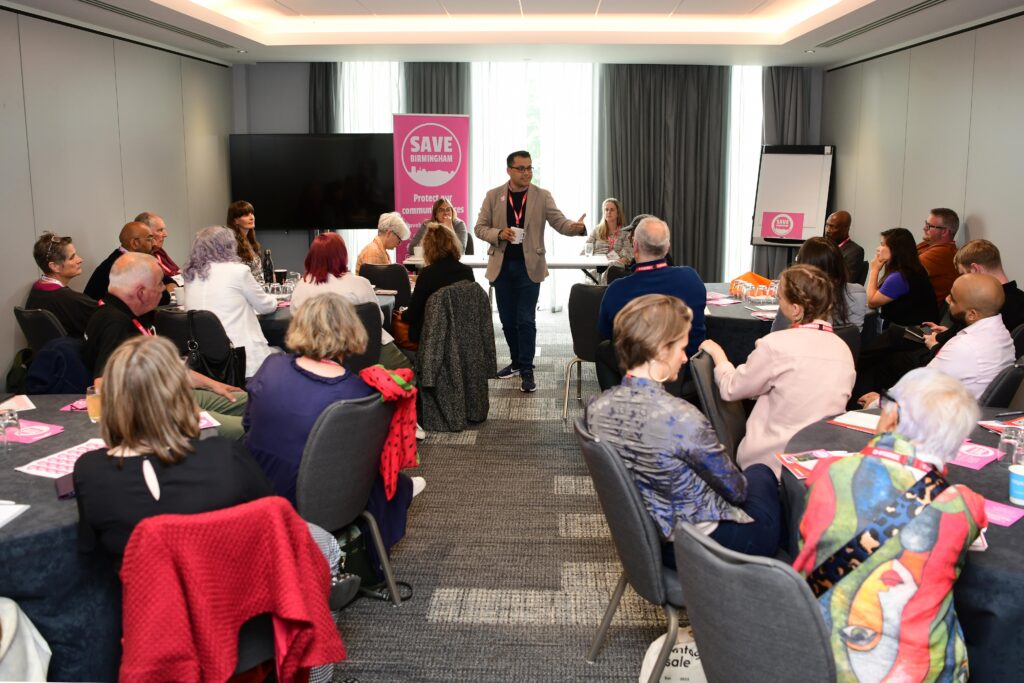
Jones noted that when the bankruptcy was announced, the campaign had to be formed quickly. “At the old Central Co-op Support Centre, Save Birmingham was formed with a flip chart and marker strategy session on a Friday and the campaign was ready to go on the Monday,” he said.
The campaign struck a chord. Jones appeared on several media outlets including Sky News and BBC WM Radio, and a cross-party motion was passed by Birmingham City Council supporting the campaign. The campaign also received funding from the Barrow Cadbury Trust to fund a part-time campaign co-ordinator, Kathy Hopkin, who spoke about how the campaign has developed.
“I wanted to get involved because it was a positive campaign,” she said, describing how she has been working with groups to identify community assets that are at risk, and with those interested in community asset transfers, as well as talking to community groups in other cities, who are interested in replicating the Save Birmingham campaign, including people from Nottingham and Leicester.
On mutualisation at a larger scale, the transfer of the Co-op Bank back into mutual ownership was also discussed at the Congress, with Gary McDermott, chief commercial officer of the Co-op Bank (sponsors of the event), providing an update on its sale to Coventry Building Society. The sale will make Coventry the 7th largest financial provider in the UK.
Related: Co-op Bank returns to mutual ownership as Coventry Building Society signs deal
He said the bank would continue to use its brand for now, and offer current services, but “its scale and resilience will improve” and in the future will be able to offer more services, including to credit unions, co-ops and social enterprises.
McDermott also reiterated the bank’s commitment to the communities it serves, its Ethical Policy and its support of Co-operatives UK’s Business Support for Co-ops programme.
The Co-op Bank is a high street name, but beyond big brands, a public lack of awareness about co-operative business is a stumbling block when trying to talk about the good co-ops can do: should conversations first be about what co-ops can do to inspire discussion about collectivism?
Journalist and economic commentator, Grace Blakeley, highlighted that while there are many examples of people coming together, the biggest issue is that people “do not see participation and collective organising as something for people like them”. She attributed this to living in an individualistic society and said co-ops could feed into this narrative by telling stories that challenge individualism.
But to do this, said broadcaster and author Nihal Arthanayake, co-ops first need to listen to their members and colleagues. “Organisations lead with numbers, but numbers don’t excite people,” he pointed out.
He warned that terms like “co-op movement” are “techno speech” and encouraged co-ops to use stories about people to tell stories about their organisation: “A co-op is a group of humans.”
This is what the Co-op Group is trying to do, in an attempt to reframe itself and the wider co-op movement in the eyes of the public. “Because we’re a co-op, membership is meaningful, we are about the business of creating value,” said chief membership and customer officer, Kenyatte Nelson.
He added that while membership is the central driver for the Co-op Group, action can sometimes be difficult when taking into account commercial aspects and the need to compete in a tough market environment.
This was echoed by the Co-op Group’s CEO, Shirine Khoury-Haq, who said the society is on a mission to explain the “economic, social and ownership” value of membership. She explained that the Co-op Group was able to dominate the food industry until the 1960s and 1950s “by really understanding what its members wanted”.
Khoury-Haq said she fundamentally believes in the concept of co-ops and the fact they have a different type of business, with consumers having a sense of ownership and being able to drive that business. She said it is important for co-ops everywhere to adhere to the same values and principles. “That makes us a different type of organisation,” she added.
She acknowledged the challenges of working together (“Sometimes co-operation can be really difficult”) and thinks that while jointly buying and distributing has been a great success for retail co-ops in the UK, co-operation in other areas has been less successful.
Still, co-ops and mutuals can work together to approach the government on a range of issues, including raising capital and “working together makes you bigger than the individual parts,” she said, adding that having a cabinet minister would be a great opportunity for co-ops.
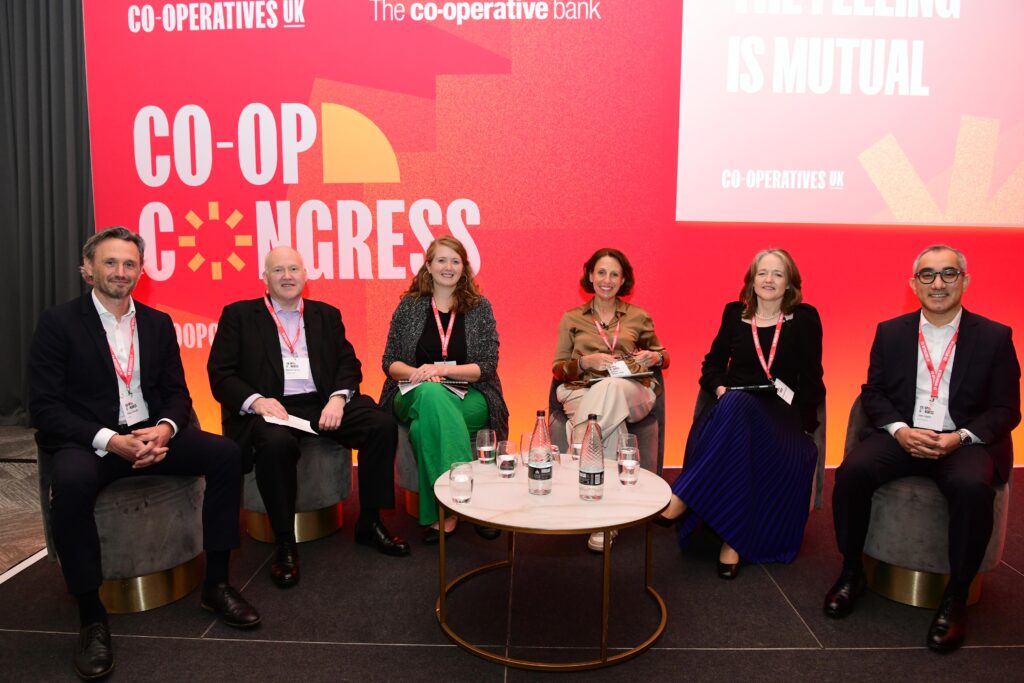
Khoury-Haq was speaking as part of a panel on how co-ops and mutuals can work better together. Co-operatives UK says the distinction between ‘co-ops’ and ‘mutuals’ is one of control: both are owned by their members, but co-ops have the element of democratic member control. But the panel’s general consensus was that co-ops and mutuals could achieve more if they talked more about what they had in common.
Jim Islam, CEO of finanical mutual One Family, called on co-ops and mutuals to work together, not in silos, to increase their influence and impact, including on issues such as legislative changes. For his organisation, being a mutual allows it to listen to its members and address issues such as the lack of social mobility, the lack of safety nets, an ageing demographic and the AI technological revolution.
“What matters is ‘What are we doing and for what purpose?’”, he said.
For agricultural co-op Arla, which has a UK subsidiary, delivering a surplus for farmer members is a core purpose. Paul Dover, Arla UK’s agriculture director, explained that difficult decisions can put a stress on democracy – but communication and listening to members can address this issue.
Arla has 2,000 farmer members in the UK, whom it aims to serve by adding value to every litre of milk and retaining a 3% surplus for farmers. Some of this surplus is used to invest in the business, explained Dover. For example, Arla invested £179m in a site to use British milk to export mozzarella internationally. Another investment saw it develop its plant-based butter – which was initially an unpopular decision with the farmers.
When such a difficult conversation occurs, Arla seeks to ensure farmers trust the co-op by using elected farmer owners to work in their districts to engage with farmers.
Kevin Parry OBE, chair of Nationwide and Royal London, thinks co-ops need to work closely with politicians to ensure legislation is amended to address the problem many mutuals face when it comes to accessing capital. He warned co-ops and mutuals about focusing too much on the difference between their legal structures, explaining that “it’s a level not likely to be understood by the parliament or the general public”. Having a designated minister would help societies, he added.
Shelagh Hancock, the CEO of First Milk, agreed. “Most people don’t understand or care whether you are a co-op or mutual,” she said, arguing that storytelling is a more powerful way to demonstrate to consumers what supporting local farmers means, both in terms of how their food is produced and connecting them to the local rural community to see the impact they are having.
She thinks businesses that have a purpose can be a force for good when they get together, and called on co-ops and mutuals to work more closely with a “more coherent approach”.
Being a different business model comes with specific challenges, and for co-ops, this includes the issue of financial reporting. In a workshop, co-operative and accounting experts described some of the problems the sector faces when reporting using standards set by the International Accounting Standards Board – designed increasingly for capital-centric businesses.
Co-ops should have their own Statement of Recommended Practice (SORP), argued Vivian Woodell, explaining that this is needed for co-ops to be able to tell their story through their accounts. This was reiterated by Maureen McCulloch and Ian Adderley, who in 2021 authored a paper on Accounting and Reporting for Co‑operatives in the UK for the University of Birmingham (with Elisavet Mantzari and Daphne Rixon).
“Accounting standards are moving away from the co-op model,” said McCulloch, explaining that the pressure of co-ops to conform to the corporate model leads to “a fragmented, re-inventing the wheel approach to accounts”. Another issue is that in the UK, co-ops can fall under nine possible legal formats – which itself further emphasises the need for coherent accounting standards.
Co-ops included in the research said they are not able to tell the story from the member value point of view.
McCulloch added that while member value is different for different co-ops and different members, finding accounting standards could still be done.
The current system’s challenges include the lack of reflection on the co-op principles and the invisibility of the member role in financial reports. For example, member benefits, apart from the return on capital, are ignored and co-op ownership is not recognised: “Member benefit cannot be explained as a share of profit, it’s much wider than that.”
Solutions could include reporting aligning with co-op principles, a recognition of participation rather than capital as key to co-ops, a statement of member benefits, co-op-specific ratios for analysing organisations within the co-op movement, and flexibility in accounting treatment and guidelines for co-ops.
Meanwhile, Adderley, the mutuals technical specialist at the Financial Conduct Authority, called on societies to engage with his institution to help drive quality and consistency in financial reporting. And Ruth Buchanan, head of finance at Co-operatives UK, called on co-ops to get in touch with the apex to share their concerns and access advice.
Before reaching the stage of reporting, however, for many communities and early-stage co-ops, the immediate hurdles are around access to support in the first place – and getting people to understand what they’re trying to do.
In a session hearing how communities have been ‘doing it for themselves’, panellists shared how they have witnessed different communities (“communities of place, communities of need”) using “collective voices to speak up” – and how co-op principles have supported this.
Christxpher Oliver, policy and research officer at the Ubele Initiative, a social enterprise with a mission to contribute to the sustainability of the African Diaspora community, described how the organisation stood at an intersection of the co-op movement. “We’re not a co-op, but we connect with co-ops in interesting ways,” he said
He described how before Ubele, he was involved in exploring problems associated with the Windrush scandal, and traveled across the UK helping communities access legal support.
“What does culturally appropriate infrastructure support look like,” he asked, “when 92% of community share offers are led by white people?”
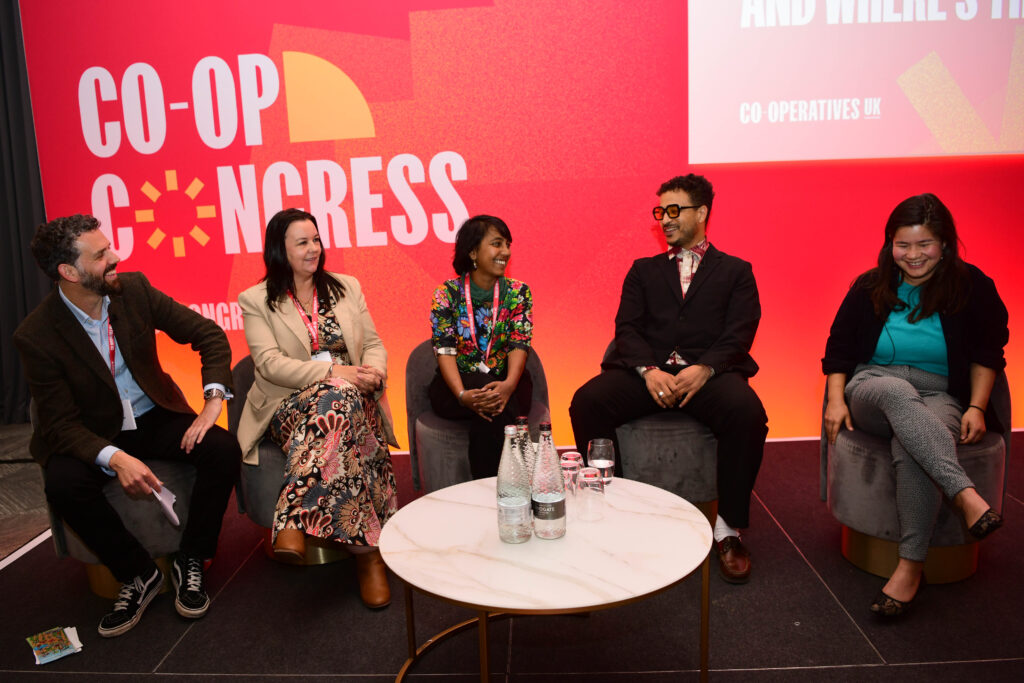
Natasha Natarajan, from tech co-op Outlandish and the SPACE4 workspace in Finsbury Park, described how the building provides a convening space between the government and local economy, addressing the fact that “there aren’t many spaces for the co-op movement to convene”.
SPACE4 has a strong relationship with Islington council, Natarajan said. “They support co-ops and community wealth building in the borough,” and the space serves political education about democratic needs.
Related … Cooperate Islington: Collaborating on a new co-op development agency
“But there needs to be more resources put towards co-op education and we need to make it normal to talk about co-ops and community shares,” she said, adding that while co-ops have a lot of opportunity to show co-op values to other businesses, the culture does not exist to explain co-ops.
“We should start by introducing democratic systems into businesses … we talk about what it means to collaborate. We demonstrate and embody the spirit of co-operation with other co-ops, but also with the general public.”
Sara Barlow, secretary of Voice of the Postmasters (VotP), described how the Post Office movement has been battered by the Horizon scandal, leaving individual postmasters feeling lost and isolated within the business, even though they are at the heart of their communities. “During Covid, our branch was a hub, helping over 300 people a day with shopping, collecting prescriptions and taking calls,” she said.
In 2022, VotP was founded to “provide a space for postmasters to come together, share experiences, and support each other in their important role within the postal service,” said Barlow. “We wanted to be treated more like a partner in the organisation. Now we have a seat at the table … Everyone thought they were alone, but as a collective, it’s never just us. One voice can make a difference, but collectively we speak louder.”
Reflecting on Barlow’s experience, Isla McCulloch, who manages Co-operatives UK’s community shares standards work, described how every community share offer she has worked on “emerged from a crisis or a disaster, a failure of market of state, and from people asking how can we, as a community, address this and step into this breach?”
Community share offers work best when everyone is at the table, she said. “The first step is a public meeting, and a collective moment of acknowledging this is a bad moment”.
But, she added, “it’s really difficult to be representative, to challenge people’s culture, sense of self and sense of identity, and bring people together to acknowledge the challenge.”
Community wealth building is talked about a lot, added McCulloch, “but what isn’t talked about is that we’re in a system of community wealth extraction. Organisations need capital, workers, suppliers and customers. Those are our stakeholders. The current [capitalist] model gives primacy to the providers of capital – the co-op model doesn’t do this, it prioritises all stakeholders.”
The 2024 Congress also featured panels dedicated to specific sectors – including housing, energy and politics.
In a session on co-ops and renewable energy, panellists discussed the “massive scope for community energy to grow” and how education and the different types of community energy models should be harnessed to empower the sector.
Michaela Cryar, director of Younity said she had “never seen people so interested in energy”.
“Eco anxiety is on the rise – but through community energy, you can get involved and take action and make things happen in your community,” she said.
Younity is a joint venture between Midcounties and Octopus Energy, which tries to address challenges in the sector, and bridge the gap between community energy producers and the national grid. Younity purchases power from 230 groups (“which gives them a route to market – this is about 30% of the community energy market”), offers grant funding and has a £1.5m Community Energy Kickstart fund. It has also set up Community Energy Connect – where community groups can share needs, from PR to engineering, which are picked up by other volunteers.
Resource is a constant challenge, said Cryar, as is education. “If you don’t know community energy exists, that’s a huge barrier to entry.”
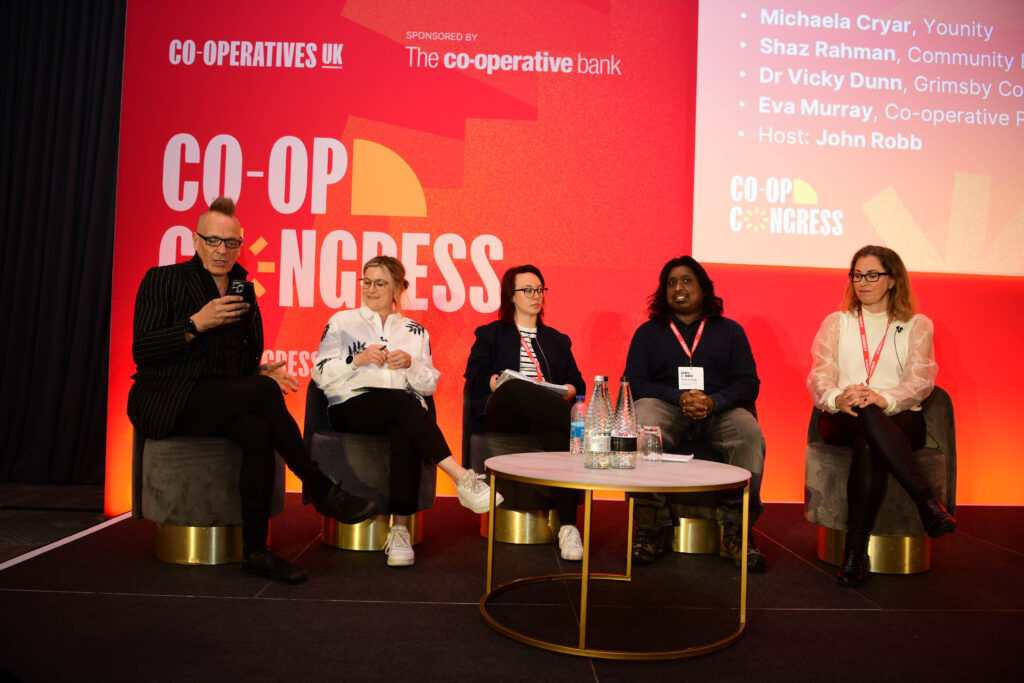
Eva Murray, campaigns officer at the Co-operative Party, agreed. “Lots of people don’t know what we’re talking about,” she said. “If you don’t have a local project or genuine personal interest, you don’t see the benefit. We need an effective campaign to educate people.”
This lack of understanding extends to councils and government, too, she added, but said a new government could genuinely push co-op and community energy. The challenge then would be around managing expectations, she said, “because this is a long-term project”.
Shaz Rahman, from Community Energy Birmingham, said a Labour & Co-op MP as business secretary would “hopefully mean they see the value of the sector and put more resources into it”. But relationships with and the education of local authorities are also vital, he added, because councils themselves are under-funded and at risk. “But if we can build relationships with people who value co-ops, then we have a chance when fighting against 100 other voices trying to get heard.”
Dr Vicky Dunn described how Grimsby Community Energy began in 2016 with three founders, and has grown to over 100 – and how for her area, the de facto ban on onshore wind, put in place in 2015 by then prime minister David Cameron, had been a huge issue for local schemes.
Politics was also a thread running through a session on housing, with Confederation of Cooperative Housing (CCH) CEO, Blase Lambert, highlighting the sector’s asks of a new government, including a Co-operative Housing Act that creates a legal form of co-operative tenure; amending the Localism Act to create a ‘presumption in favour’ of disposing public land and buildings to co-ops; and investing in a mechanism that allows co-op housing organisations to access low-cost finance, among others.
Related … Overcoming the barriers to co-op housing development in the UK – Interview with Blase Lambert
Casey Edwards, community-led housing programme manager at Cwmpas, the co-op development agency covering Wales, described how the Communities Creating Homes project, funded by theWelsh government and the Nationwide Foundation, provides advice to groups who want to set up affordable housing co-ops. It is currently supporting 38 groups, with 276 affordable homes in the pipeline.
Housing is a devolved issue, she added, and the current cabinet secretary has committed to including community and co-operative housing in its targets to 200,00 homes by 2026 when the next Welsh elections take place. Cwmpas research has highlighted the “wider, softer benefits” of this type of housing, too: people feel less isolated or lonely, learn new skills, and know more of their neighbours. They also feel more secure, less worried about rent, and part of supportive community.
“Housing is the foundation of communities – the outlook is positive with co-ops as long as we involve communities,” she said, adding that often when local authorities and government do housing assessments, they aren’t providing the right homes in the right places.
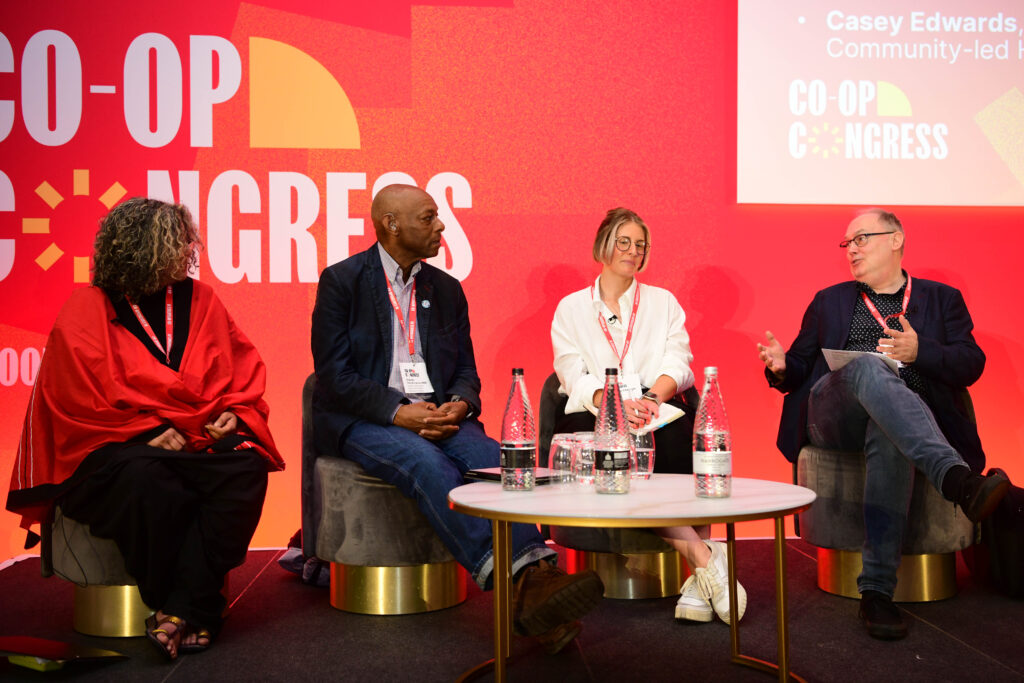
Claude Hendrickson’s story started in the late 1980s. “I’m a child of the Windrush generation, and watched my parents go from slum landlord to slumlord,” he said. In his 20s, young, single, black men were at the bottom of the social housing ladder; “so we thought, why don’t we build our own homes?” He became manager of the Frontline community self-build scheme in Leeds which in 1996 saw 12 unemployed Afro Caribbean men and their families build homes for themselves.
“We solved a housing issue while learning skills we could use in future employment, and banged the drum about people being involved in solving their own housing issues … There were a lot of barriers, and a lot of negative perceptions of black ethnic minority men, and I wanted to prove them wrong.”
Related: Meet … Claude Hendrickson: Leading light of community self-build housing
Jaimini Bharakhada, chair of the Belgrave Neighbourhood Cooperative Housing Association (BNCHA), spent her career working for Leicester City Council before retiring on medical grounds, and getting involved in her own housing co-op, where she witnessed a lack of governance and engagement – and repairs not being made. “We nearly lost the co-op,” she said.
“We have nearly 400 homes, and most of our tenant members didn’t know who their landlord was, so over the next three years we were educating, door knocking, and holding day events and policy sessions, telling people, this is your co-op.” BNCHA received CCH’s Active Member Strategy Award in 2022.
The Congress took place just under three weeks before the UK’s general election, which will most likely see a Labour Government in power – and the same week that Labour launched its manifesto reaffirming its pledge to double the size of the co-op economy.
In a video address, Labour/Co-op business spokesperson Jonathan Reynolds said he was “incredibly proud to be a parliamentary candidate that’s jointly sponsored by the Labour and Co-operative parties,” while Jim McMahon, chair of the Co-op Party, said Labour’s manifesto launch on 13 June “was a pretty good day for co-operators – a lot of what we’ve been talking about for a long time has been secured in Labour’s manifesto for government”.
Related: Labour business lead talks up hopes for boosting co-op sector
“We want to be ambitious,” added Co-op Party general secretary, Joe Fortune, “and doubling the size of the sector is a way of talking about that ambition … but with this comes responsibility. We need to be the ones driving that growth, showing what it means to be a co-op, why it matters and how we’re going to do it.”
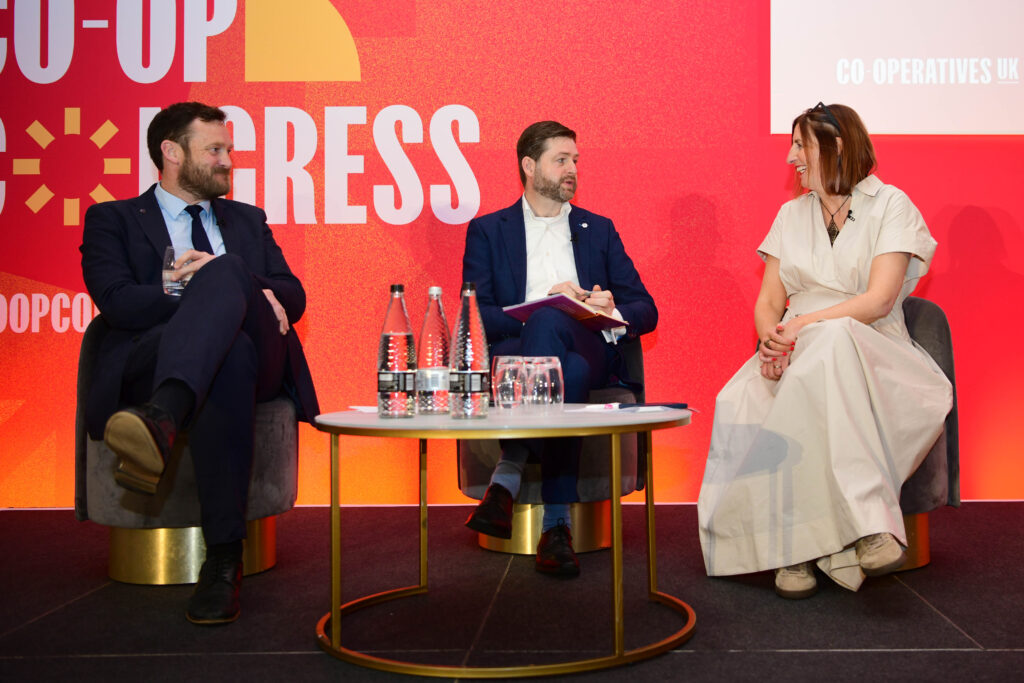
Co-operatives UK AGM
The Congress also featured Co-operatives UK’s annual AGM, in which members voted to increase board fees by 3%.
Co-operatives UK is the voice of the UK’s 7,000 co-ops. It has 998 direct and 33 federal members, 156 of which were acquired over the past year.
A record-breaking 305 co-ops came to Co-operatives UK for advice and support, said CEO Rose Marley. The apex also organised a series of events, for which it has over 1,600 sign-ups.
Around 70% of members said they would recommend Co-operatives UK.
The apex reported a surplus after tax of £314,575 for the year, but this includes community share booster funds.
Marley said the future could bring many opportunities for the sector, including a new government, the upcoming UN International Year of Co-operatives and the celebration of 180 years since the Rochdale Pioneers set up their society.
She asked members to continue to support and challenge Co-operatives UK.
“Here’s to the next 180 years,” she said.
You can rewatch all sessions from the 2024 UK Co-op Congress here.

